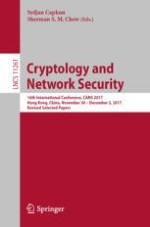2018 | OriginalPaper | Buchkapitel
Towards a Smart Contract-Based, Decentralized, Public-Key Infrastructure
verfasst von : Christos Patsonakis, Katerina Samari, Mema Roussopoulos, Aggelos Kiayias
Erschienen in: Cryptology and Network Security
Aktivieren Sie unsere intelligente Suche, um passende Fachinhalte oder Patente zu finden.
Wählen Sie Textabschnitte aus um mit Künstlicher Intelligenz passenden Patente zu finden. powered by
Markieren Sie Textabschnitte, um KI-gestützt weitere passende Inhalte zu finden. powered by
